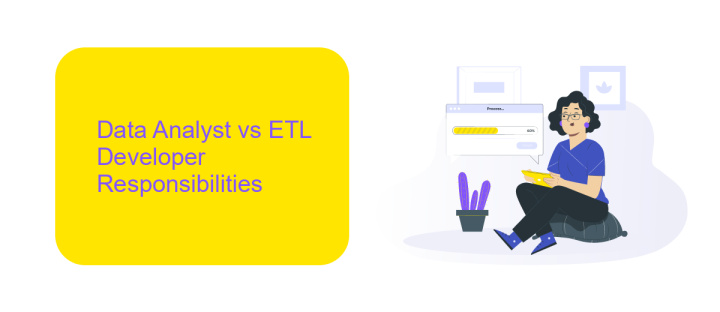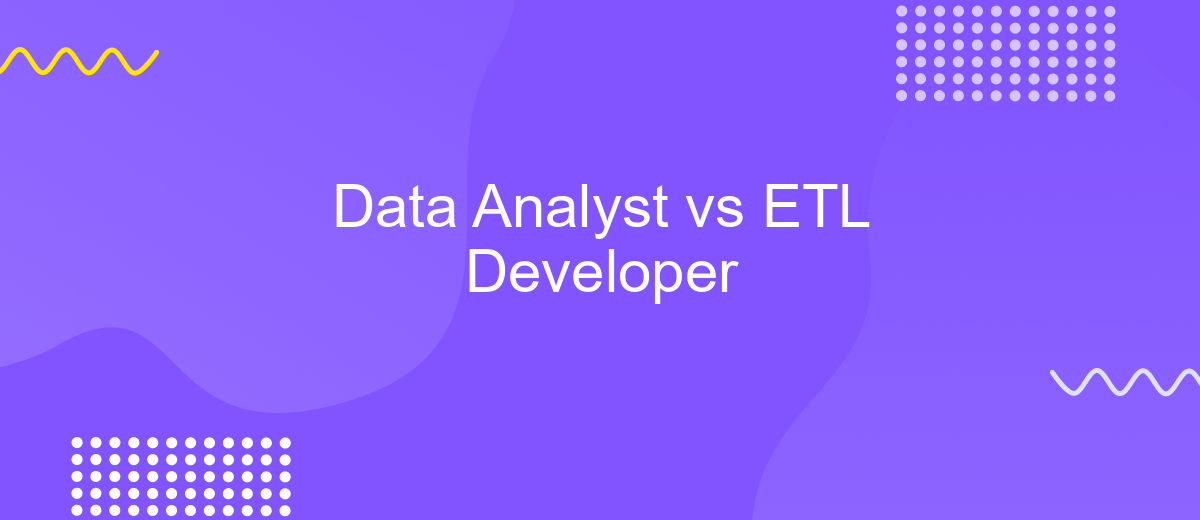Data Analyst vs ETL Developer
In today's data-driven world, the roles of Data Analysts and ETL Developers are crucial for transforming raw data into actionable insights. While both positions work closely with data, their responsibilities and skill sets differ significantly. This article delves into the distinct roles, key responsibilities, and essential skills of Data Analysts and ETL Developers, helping you understand which career path might be the best fit for you.
Introduction
In the ever-evolving landscape of data management, two prominent roles often come into focus: the Data Analyst and the ETL Developer. While both positions are crucial for leveraging data to drive business decisions, they each have distinct responsibilities and skill sets. Understanding these differences can help organizations optimize their data strategies and individuals choose the right career path.
- Data Analyst: Primarily focuses on interpreting and visualizing data to provide actionable insights.
- ETL Developer: Specializes in Extract, Transform, Load processes to ensure data is accurately and efficiently moved between systems.
Both roles are integral to the data ecosystem but serve different functions. Data Analysts turn raw data into meaningful reports, while ETL Developers ensure that data is clean, accessible, and ready for analysis. Tools like ApiX-Drive can facilitate the integration of various data sources, making the ETL process more streamlined and efficient, thereby supporting both roles in their respective tasks.
Data Analyst vs ETL Developer Responsibilities

A Data Analyst primarily focuses on interpreting complex data sets to help organizations make informed business decisions. Their responsibilities include collecting, processing, and analyzing data to identify trends and patterns. They utilize statistical tools and software to create visualizations and reports that communicate their findings to stakeholders. Data Analysts often work closely with various departments to understand their data needs and provide actionable insights that drive strategic planning and operational improvements.
On the other hand, an ETL (Extract, Transform, Load) Developer is responsible for designing and implementing processes to extract data from various sources, transform it into a suitable format, and load it into data storage systems. Their work ensures that data is accurate, consistent, and available for analysis. ETL Developers often use tools like ApiX-Drive to streamline data integration across different platforms, enhancing efficiency and reliability. They collaborate with Data Analysts to ensure that the data pipeline supports the analytical needs of the organization, facilitating seamless data flow and accessibility.
Skillset Comparison

When comparing the skillsets of a Data Analyst and an ETL Developer, it's crucial to understand their distinct roles and responsibilities. A Data Analyst focuses on interpreting data to provide actionable insights, while an ETL Developer is responsible for the extraction, transformation, and loading of data from various sources.
- Data Analysis: Data Analysts excel in statistical analysis, data visualization, and business intelligence tools like Tableau and Power BI.
- Programming: Data Analysts often use languages such as Python and R, whereas ETL Developers are proficient in SQL, Java, and ETL-specific tools like Informatica and Apache NiFi.
- Data Integration: ETL Developers specialize in integrating data from multiple sources, and tools like ApiX-Drive can simplify this process by automating data workflows and integrations.
- Database Management: ETL Developers are skilled in database management systems like MySQL, Oracle, and SQL Server.
Overall, while both roles require a strong foundation in data manipulation and analysis, the tools and techniques they use differ significantly. Data Analysts focus more on interpreting and visualizing data, whereas ETL Developers concentrate on the technical aspects of data integration and management.
Career Path and Salary Expectations

The career paths for Data Analysts and ETL Developers, while interconnected, offer distinct trajectories and opportunities. Data Analysts typically start their careers with entry-level roles such as Junior Data Analyst or Business Analyst, gradually moving up to Senior Data Analyst, Data Scientist, or even Chief Data Officer roles. ETL Developers, on the other hand, often begin as Junior ETL Developers or Data Engineers and can advance to Senior ETL Developer, ETL Architect, or Data Engineering Manager positions.
When it comes to salary expectations, both roles offer competitive compensation, though they may vary based on experience, location, and industry. Data Analysts can expect starting salaries ranging from ,000 to ,000 annually, with senior roles earning upwards of 0,000. ETL Developers generally have a higher starting salary, typically between ,000 and ,000, with senior positions earning well over 0,000.
- Data Analyst: ,000 - 0,000+
- ETL Developer: ,000 - 0,000+
Both career paths are in high demand due to the increasing reliance on data-driven decision-making. Tools and services like ApiX-Drive can be particularly beneficial for ETL Developers, simplifying the process of integrating various data sources and automating workflows, thereby enhancing efficiency and productivity.
Conclusion
In conclusion, both Data Analysts and ETL Developers play crucial roles in managing and utilizing data within an organization. Data Analysts focus on interpreting data and providing actionable insights, while ETL Developers are responsible for extracting, transforming, and loading data to ensure it is accessible and usable for analysis. Each role requires a unique skill set and serves a different but complementary purpose in the data management process.
Choosing between a career as a Data Analyst or an ETL Developer depends on your interests and skill set. If you enjoy working directly with data to uncover trends and insights, a Data Analyst role may be the right fit. On the other hand, if you are more interested in the technical aspects of data integration and management, an ETL Developer role might be more suitable. Tools like ApiX-Drive can further enhance the efficiency of both roles by simplifying data integration processes, ensuring seamless and reliable data flow across various platforms.
FAQ
What is the primary role of a Data Analyst?
What is the primary role of an ETL Developer?
What skills are essential for a Data Analyst?
What skills are essential for an ETL Developer?
How can automation and integration tools assist both roles?
Do you want to achieve your goals in business, career and life faster and better? Do it with ApiX-Drive – a tool that will remove a significant part of the routine from workflows and free up additional time to achieve your goals. Test the capabilities of Apix-Drive for free – see for yourself the effectiveness of the tool.

